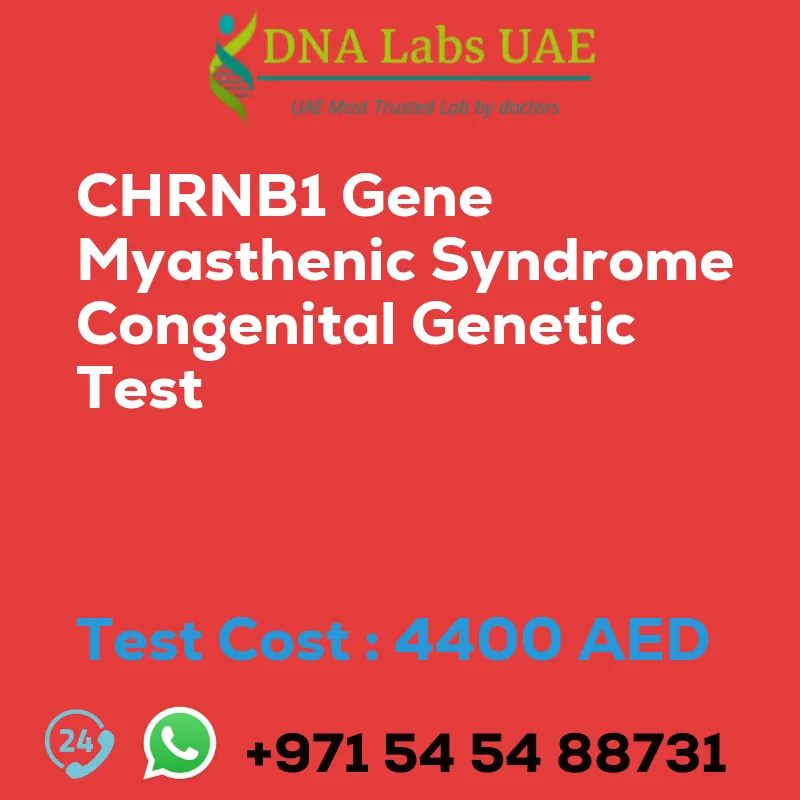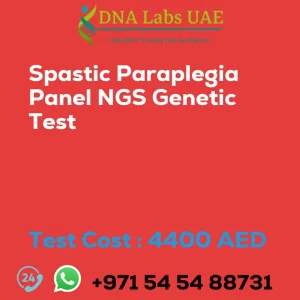CHRNB1 Gene Myasthenic Syndrome Congenital Genetic Test
Welcome to DNA Labs UAE, where we offer the CHRNB1 Gene Myasthenic Syndrome Congenital Genetic Test. This test is designed to analyze the CHRNB1 gene, which is associated with a type of congenital myasthenic syndrome (CMS), a rare genetic disorder affecting the neuromuscular junction.
Test Components
The CHRNB1 Gene Myasthenic Syndrome Congenital Genetic Test includes:
- NGS Technology
Price
The cost of the CHRNB1 Gene Myasthenic Syndrome Congenital Genetic Test is 4400.0 AED.
Sample Condition
We accept the following sample conditions for this test:
- Blood
- Extracted DNA
- One drop of blood on FTA Card
Report Delivery
You can expect to receive your test report within 3 to 4 weeks.
Method
The CHRNB1 Gene Myasthenic Syndrome Congenital Genetic Test utilizes NGS (Next-Generation Sequencing) technology.
Test Type
This test is specifically designed for neurological disorders.
Doctor
This test is performed under the supervision of a neurologist.
Test Department
The CHRNB1 Gene Myasthenic Syndrome Congenital Genetic Test is conducted in our Genetics department.
Pre Test Information
Before undergoing the CHRNB1 Gene Myasthenic Syndrome Congenital Genetic Test, it is important to provide the following:
- Clinical history of the patient
- A genetic counseling session to draw a pedigree chart of affected family members
Test Details
The CHRNB1 gene is associated with a type of congenital myasthenic syndrome (CMS), a group of rare genetic disorders that cause muscle weakness and fatigue, typically appearing in infancy or childhood. NGS genetic testing is used to identify mutations or variants in the CHRNB1 gene that may be responsible for the disorder. This type of genetic testing allows for a comprehensive analysis of the entire coding region of the CHRNB1 gene, detecting various types of mutations, including single nucleotide variants, small insertions or deletions, and larger structural variants. This comprehensive approach ensures a more accurate diagnosis, guiding treatment decisions and genetic counseling.
NGS genetic testing for CHRNB1 gene-related myasthenic syndrome is recommended for individuals exhibiting symptoms such as muscle weakness, fatigue, and respiratory difficulties. It can also be used for carrier testing in family members of affected individuals. It is important to consult with a healthcare professional or genetic counselor to determine the appropriateness and implications of testing, as well as to interpret the results.
| Test Name | CHRNB1 Gene Myasthenic syndrome congenital Genetic Test |
|---|---|
| Components | |
| Price | 4400.0 AED |
| Sample Condition | Blood or Extracted DNA or One drop Blood on FTA Card o |
| Report Delivery | 3 to 4 Weeks |
| Method | NGS Technology |
| Test type | Neurological Disorders |
| Doctor | Neurologist |
| Test Department: | Genetics |
| Pre Test Information | Clinical History of Patient who is going for CHRNB1 Gene Myasthenic syndrome, congenital NGS Genetic DNA Test A Genetic Counselling session to draw a pedigree chart of family members affected with CHRNB1 Gene Myasthenic syndrome, congenital |
| Test Details |
The CHRNB1 gene is associated with a type of congenital myasthenic syndrome (CMS), which is a group of rare genetic disorders that affect the neuromuscular junction. These disorders result in muscle weakness and fatigue, often starting from infancy or childhood. NGS (Next-Generation Sequencing) genetic testing is a type of genetic testing that uses advanced sequencing technologies to analyze multiple genes simultaneously. In the context of CHRNB1 gene-related myasthenic syndrome, NGS genetic testing can be used to identify mutations or variants in the CHRNB1 gene that may be causing the disorder. By analyzing the entire coding region of the CHRNB1 gene, NGS can detect various types of mutations, including single nucleotide variants, small insertions or deletions, and larger structural variants. This comprehensive approach allows for a more accurate diagnosis and can help guide treatment decisions and genetic counseling. NGS genetic testing for CHRNB1 gene-related myasthenic syndrome may be recommended for individuals with symptoms suggestive of CMS, such as muscle weakness, fatigue, and respiratory difficulties. It can also be used for carrier testing in family members of affected individuals. It’s important to note that genetic testing should be done in consultation with a healthcare professional or genetic counselor who can provide guidance on the appropriateness and implications of testing, as well as help interpret the results. |








